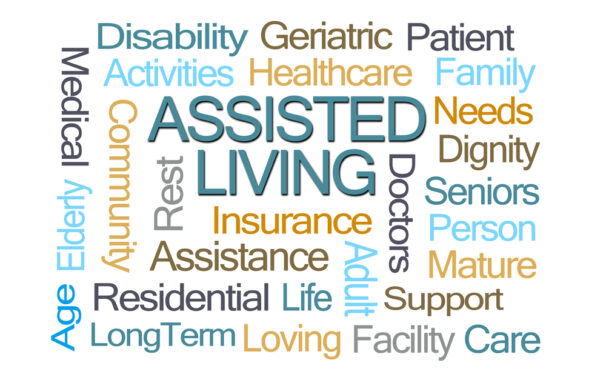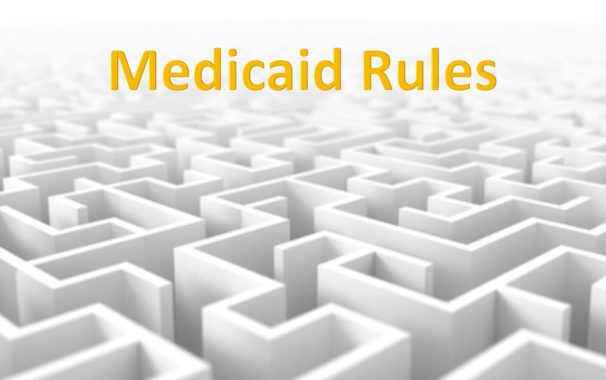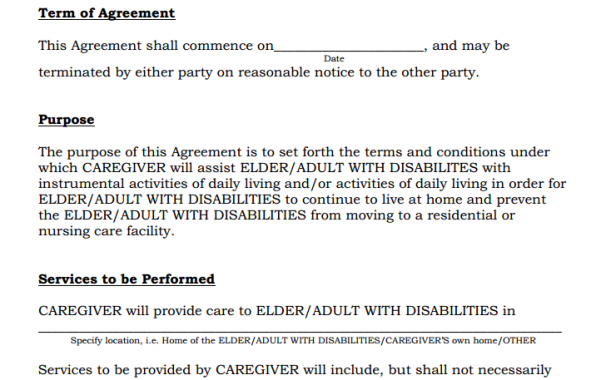The agency governing the Medicaid program in New Jersey is the New Jersey Department of Human Services, Division of Medical Assistance and Health Services (DMAHS). On March 26, 2024, DMAHS announced an increase in the Medicaid penalty divisor from $384.57 to $440.10 per day, amounting to $13,395.50 per month, effective April 1, 2024. For all.. read more →

In this case, K.L., a Medicaid applicant, was assessed a penalty period, or period or ineligibility for Medicaid nursing home benefits, of 604 days based upon (1) the failure to obtain fair market value for a life estate owned by K.L. when real estate containing the life estate interest was sold, and (2) a number.. read more →

This matter arose from the imposition of a transfer penalty on Petitioner’s receipt of Medicaid benefits. Beginning in 2018, Petitioner resided with her son, R. R., and R. R. ‘s wife. Petitioner previously resided in her own home. On November 1, 2018, Petitioner and R. R. executed a “Room Rental Agreement, ” wherein Petitioner agreed to.. read more →

A.V. suffered from Alzheimer’s disease and dementia. In January 2021, A.V. moved into a skilled nursing facility. That April, she filed her first application for Medicaid benefits, seeking a community spouse resource allowance for her husband, J.V. In June 2021, the Cumberland County Board of Social Services (CCBSS) denied the claim, advising A.V. and J.V… read more →

In this case, the New Jersey Superior Court, Appellate Division, reversed a final decision of the state Medicaid agency imposing a 203-day period of disqualification for Medicaid benefits based upon the applicant’s alleged transfer of assets for less than fair market value within the five-year look-back period before the applicant entered a nursing home. J.F… read more →

Long-term care comes at a tremendous financial price, especially around-the-clock nursing home care. The cost of a private room in a nursing home in New Jersey is at least $12,000 per month, and may be more. Most people end up paying for long-term care and/or nursing home care out of their savings until they spend.. read more →

L.C. and his spouse R.S. sold their marital residence, and gave the proceeds of sale and other cash gifts to their daughter V.R. and her husband I.R. The total amount gifted was $435,000. V.R. and I.R. used the gifted assets to purchase a home. L.C. and R.S. lived at this home with V.R. and I.R… read more →

A New York appeals court held that transfers made by a Medicaid applicant before she was diagnosed with Parkinson’s disease were not transfers for less than market value subject to penalty because the transfers were made as part of a history of gifting to her children done exclusively for a purpose other than to qualify.. read more →

The Director of the Medicaid agency in New Jersey held that income in a Qualified Income Trust which was used to pay the room and board fee for a resident of an assisted living facility was not countable in determining the resident’s eligibility for Medicaid benefits. H.H. v. Monmouth County Board of Social Services – Final.. read more →

In this case, the New Jersey Superior Court, Appellate Division, (1) restricted a guardian’s ability to make gifts to those individuals expressly named as residuary beneficiaries of the ward’s Last Will and Testament; (2) limited the amount of gifts to $14,000 per person each year pursuant to a power of attorney which the ward executed.. read more →

When she was admitted to a skilled nursing facility, petitioner owned a home. Following her admission, petitioner’s son, who was petitioner’s power of attorney, applied for Medicaid benefits on her behalf. Personnel at the facility informed the son that, in order to attain Medicaid eligibility, petitioner could have no assets. As a result, petitioner’s son.. read more →

Question: My mother deeded her house to my sister and me more than seven years ago, meaning that the transfer is beyond Medicaid’s 5-year look-back period and should not affect my mother’s eligibility for Medicaid benefits. My family moved into her home (which is now owned by my sister and me) approximately 4 years ago.. read more →

A Massachusetts trial court ruled that a Medicaid hearing examiner should have accepted evidence that a Medicaid applicant’s transfer of her house fell under the caretaker child exception and that the applicant’s other transfers were not made in order to qualify for Medicaid. Coko v. Daniel Tsai, Director of the Office of Medicaid (Essex Sup. Ct… read more →

Wyoming’s highest court ruled that the state should not have denied a Medicaid applicant’s request to reduce her penalty period because her sons partially returned transferred assets by paying her attorneys’ fees. Anderson v. State of Wyoming (Wyo.,No. 2018 WY 135, Dec. 4, 2018). Nursing home resident Lucile Anderson transferred cash and property to her sons… read more →

If an applicant for Medicaid signed a contract with an assisted living facility agreeing to a pay privately for a period of time, any penalty resulting from a transfer of assets cannot begin until the end of the private pay period, even if the applicant is otherwise eligible for benefits. B.K. v Division of Medical.. read more →

After J.C. was admitted to a nursing facility, her son, S.C., submitted an application to the Camden County Board of Social Services for Medicaid benefits on her behalf. The county welfare board notified J.C. that she was eligible for long-term care benefits but her transfer of assets for less than full market value during the.. read more →

Ohio’s highest court suspended an attorney who advised his client to transfer assets in order to qualify for Medicaid and then lied to the state Medicaid agency about whether the client transferred assets. Stark County Bar Association v. Buttacavoli (Ohio, No. 2017-Ohio-8857, Dec. 7, 2017). Attorney Glen Buttacavoli’s law practice consisted of providing financial-planning advice.. read more →

Contrary to the recent decision in the G.V. v. Division of Medical Assistance and Health Services case which held that assets transferred to an Income Only Trust more than 5 years before a Medicaid application was filed were still available, rendering the applicant ineligible for benefits, the M.K. v. Morris County Board of Social Services.. read more →

New Jersey’s Medicaid rules are complicated, and always changing. One such change in the rules occurring on a regular basis is the State Medicaid agency’s amendment to the Medicaid program’s “penalty divisor.” On May 12, 2017, a Medicaid Communication, or notice from the agency, was released by New Jersey’s Division of Medical Assistance and Health.. read more →
A U.S. district court denied a preliminary injunction to a Medicaid applicant who sued New Jersey to prevent the state from denying benefits based on her dead husband’s assets. Flade v. Connolly (U.S. Dist. Ct, D. N.J., No. 16-4407, Sept. 23, 2016). Plaintiff, Eileen Flade, was a nursing home resident. On April 12, 2016, plaintiff applied for.. read more →
In general, Medicaid rules impose periods of Medicaid ineligibility (“penalty periods”) when a Medicaid applicant makes gifts of assets in an attempt to qualify for Medicaid. If a Medicaid applicant gifts assets within the 60-month “look-back” period, the applicant may be subject to a Medicaid penalty period, based on the value of the gift. Notably,.. read more →
Medicaid, unlike Medicare, is a public benefit program based upon financial need. As a result, you are eligible for Medicaid only if you are over age 65, blind or disabled, and have few assets. If an applicant is married, all assets in the sole name of the husband, in the sole name of the wife, and.. read more →
The Superior Court of New Jersey, Appellate Division, affirmed a decision of the Director of New Jersey Medicaid reversing a ruling of an Administrative Law Judge (ALJ) who reduced C.W.’s Medicaid ineligibility penalty previously assessed for transferring assets for less than fair market value. C.W. v. Division of Medical Assistance and Health Services, Docket No. A-2352-13T2.. read more →
Federal court rules that federal law does not require a State to disregard a transfer of a life estates by a Medicaid applicant to a disabled veteran. Pike ex rel. Estate of Pike v. Sebelius (D. R.I., No. CA 13-392 S, July 16, 2015). The late mother of plaintiff F. Norris Pike transferred of two life.. read more →

E.A. began residing in a home owned by her adult daughter, B.C., in September 2004. From September 2004 to June 2005, B.C. received no compensation for any caregiver services or lodging provided to her mother. From June 2005 to September 2006, B.C. received E.A.’s Social Security benefits of approximately $1500 per month to offset the.. read more →
Categories
- Affordable Care Act
- Alzheimer's Disease
- Arbitration
- Attorney Ethics
- Attorneys Fees
- Beneficiary Designations
- Blog Roundup and Highlights
- Blogs and Blogging
- Care Facilities
- Caregivers
- Cemetery
- Collaborative Family Law
- Conservatorships
- Consumer Fraud
- Contempt
- Contracts
- Defamation
- Developmental Disabilities
- Discovery
- Discrimination Laws
- Doctrine of Probable Intent
- Domestic Violence
- Elder Abuse
- Elder Law
- Elective Share
- End-of-Life Decisions
- Estate Administration
- Estate Litigation
- Estate Planning
- Events
- Family Law
- Fiduciary
- Financial Exploitation of the Elderly
- Funeral
- Future of the Legal Profession
- Geriatric Care Managers
- Governmental or Public Benefit Programs
- Guardianship
- Health Issues
- Housing for the Elderly and Disabled
- In Remembrance
- Insolvent Estates
- Institutional Liens
- Insurance
- Interesting New Cases
- Intestacy
- Law Firm News
- Law Firm Videos
- Law Practice Management / Development
- Lawyers and Lawyering
- Legal Capacity or Competancy
- Legal Malpractice
- Legal Rights of the Disabled
- Liens
- Litigation
- Mediation
- Medicaid Appeals
- Medicaid Applications
- Medicaid Planning
- Annuities
- Care Contracts
- Divorce
- Estate Recovery
- Family Part Non-Dissolution Support Orders
- Gifts
- Life Estates
- Loan repayments
- MMMNA
- Promissory Notes
- Qualified Income Trusts
- Spousal Refusal
- Transfers For Reasons Other Than To Qualify For Medicaid
- Transfers to "Caregiver" Child(ren)
- Transfers to Disabled Adult Children
- Trusts
- Undue Hardship Provision
- Multiple-Party Deposit Account Act
- New Cases
- New Laws
- News Briefs
- Newsletters
- Non-Probate Assets
- Nursing Facility Litigation
- Personal Achievements and Awards
- Personal Injury Lawsuits
- Probate
- Punitive Damages
- Reconsideration
- Retirement Benefits
- Reverse Mortgages
- Section 8 Housing
- Settlement of Litigation
- Social Media
- Special Education
- Special Needs Planning
- Surrogate Decision-Making
- Taxation
- Technology
- Texting
- Top Ten
- Trials
- Trustees
- Uncategorized
- Veterans Benefits
- Web Sites and the Internet
- Webinar
- Writing Intended To Be A Will







Vanarelli & Li, LLC on Social Media